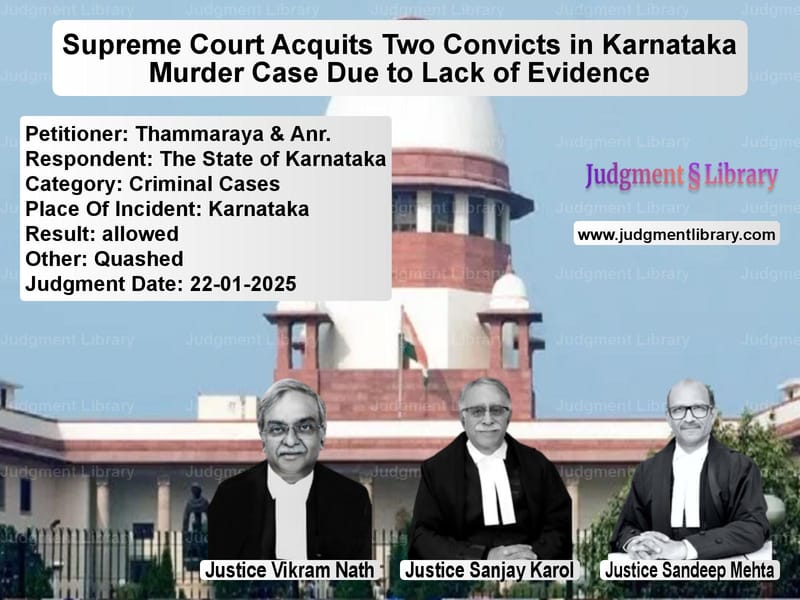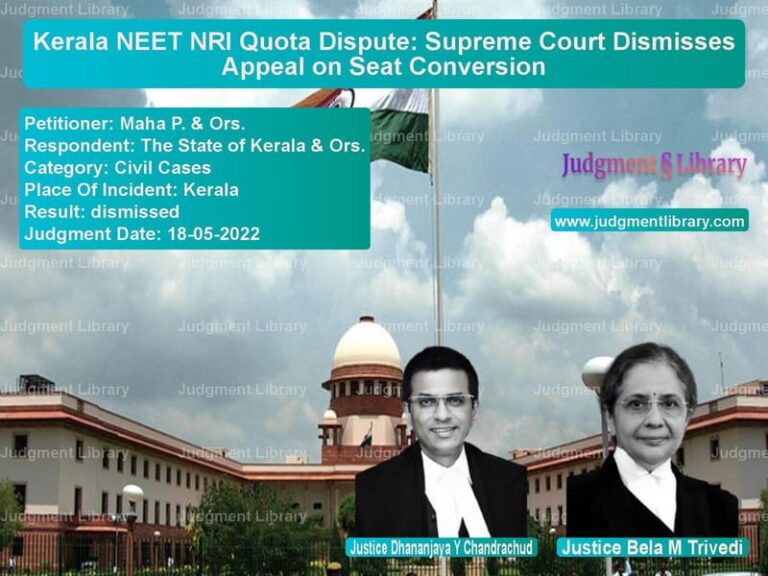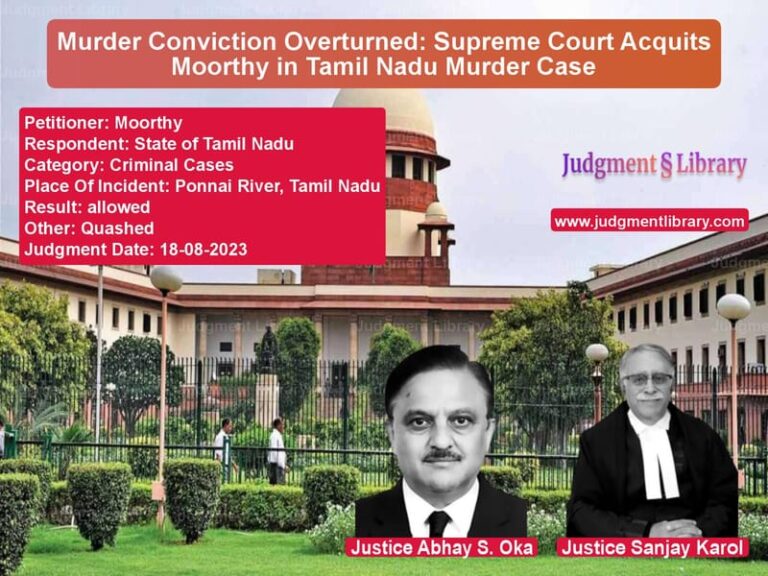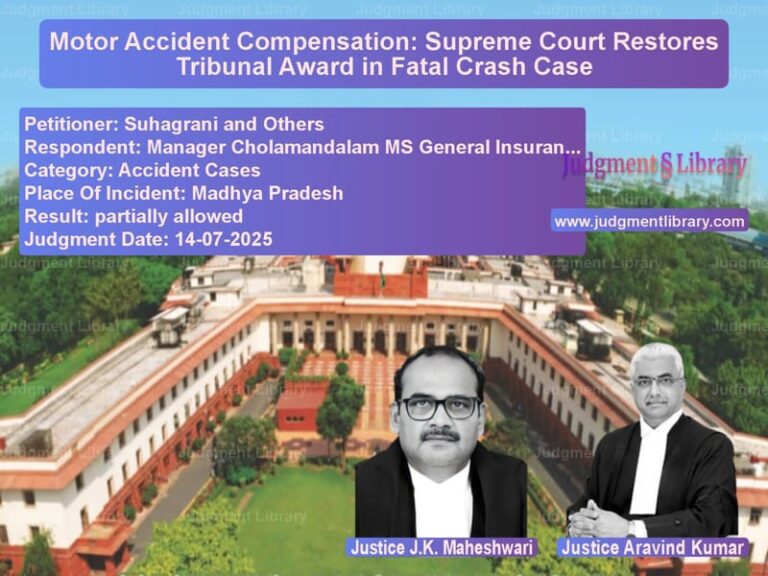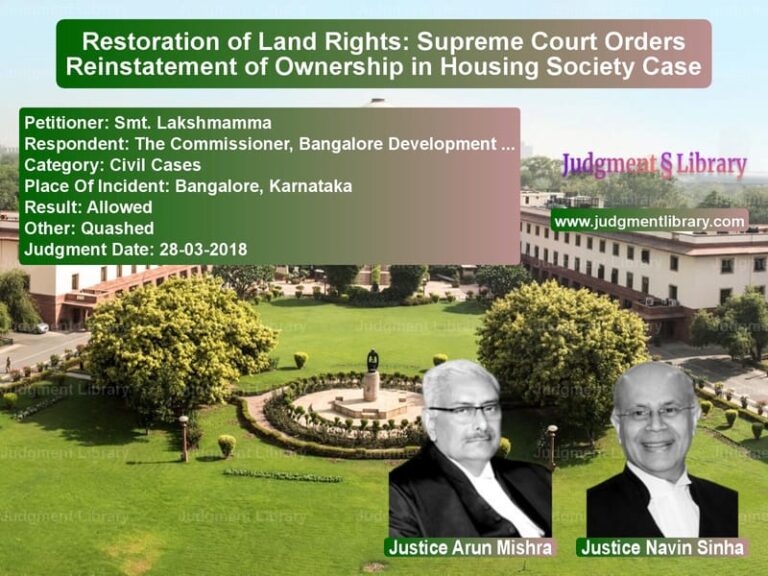Supreme Court Acquits Two Convicts in Karnataka Murder Case Due to Lack of Evidence
The Supreme Court of India, in Thammaraya & Anr. v. The State of Karnataka, delivered a landmark judgment, overturning the conviction of two accused in a murder case. The Court ruled that the prosecution failed to establish an unbroken chain of circumstantial evidence and emphasized that suspicion cannot replace proof in criminal trials. This judgment reinforces the principle that in cases based on circumstantial evidence, every link in the chain must lead to the inevitable conclusion of guilt.
The case involved the brutal killing of Shrishail, allegedly orchestrated by Manoj (A-1), Thammaraya (A-2), and Basappa (A-3). The prosecution contended that Manoj had an illicit relationship with Shrishail’s wife and conspired to eliminate him. On August 24, 2001, Manoj allegedly deceived Shrishail into believing they were visiting a doctor, only to strangle him with the assistance of Thammaraya and Basappa. The deceased’s body was dumped, and the accused attempted to cover up the crime.
Legal Issues Before the Supreme Court
- Was the circumstantial evidence strong enough to sustain the conviction?
- Did the prosecution prove the guilt of the accused beyond a reasonable doubt?
- Did the High Court err in upholding the conviction based on weak circumstantial evidence?
Trial Court Conviction and High Court Affirmation
The Trial Court convicted all three accused under Section 302 read with Section 34 IPC, sentencing them to life imprisonment. Additionally, they were sentenced to seven years under Section 201 IPC for concealing evidence. On appeal, the High Court upheld the convictions, finding the circumstantial evidence sufficient.
Petitioner’s Arguments Before the Supreme Court
The petitioners, Thammaraya and Basappa, argued that:
- There was no direct evidence linking them to the crime.
- The entire case was based on circumstantial evidence, which failed to establish an unbroken chain leading to their guilt.
- The prosecution failed to conduct a Test Identification Parade (TIP) for the allegedly recovered items.
- The recovery of stolen items from their possession was not properly proven.
Their counsel stated: “The prosecution has built its case on assumptions. The burden lies on them to prove guilt beyond reasonable doubt, but they have failed miserably. Suspicion, however strong, cannot take the place of legal proof.”
Respondent’s Arguments
The State of Karnataka argued that:
- The accused were last seen with the deceased before the murder.
- The recovered items matched those worn by the victim.
- The motive was clear: Manoj wanted Shrishail dead to continue his relationship with the victim’s wife.
- The trial court and High Court found their guilt proven beyond a reasonable doubt.
The prosecution contended: “The chain of circumstances leads only to the conclusion of guilt. The accused were involved in the murder, and their conviction must stand.”
Supreme Court’s Observations
1. Circumstantial Evidence Must be Conclusive
The Supreme Court reiterated the well-established principle that circumstantial evidence must lead only to the conclusion of guilt, excluding all other possibilities.
- “A conviction cannot rest on suspicion or conjecture. Each link in the chain must be proven beyond reasonable doubt.”
- “The prosecution has failed to establish that the accused had any role in the killing beyond mere suspicion.”
2. Lack of Test Identification Parade
The Court emphasized that no Test Identification Parade (TIP) was conducted for the recovered articles, making their connection to the accused dubious.
- “Without a TIP, the prosecution’s claim that the items belonged to the deceased holds little weight.”
3. Failure to Establish Motive Against the Petitioners
The Supreme Court noted that while Manoj (A-1) had a clear motive, the prosecution failed to show why Thammaraya and Basappa would participate in the crime.
- “Mere association with the prime accused does not establish complicity in the crime.”
4. Reliance on Police Reports and Witness Testimonies
The Court pointed out that the trial court relied heavily on police reports, without corroborating them with solid evidence.
- “Reliance on police documents, without substantive proof, raises doubts about the fairness of the investigation.”
Precedents Cited
- Sharad Birdhichand Sarda v. State of Maharashtra: Established the five principles for convictions based on circumstantial evidence.
- Shivaji Sahabrao Bobade v. State of Maharashtra: Stressed the importance of proving guilt beyond reasonable doubt.
- Ramkishan Mithanlal Sharma v. State of Bombay: Highlighted the necessity of a Test Identification Parade in proving ownership of recovered items.
Final Judgment
- The Supreme Court acquitted Thammaraya and Basappa, citing lack of conclusive evidence.
- The conviction and sentence imposed by the lower courts were set aside.
- The appellants, being on bail, were not required to surrender.
- The appeal was allowed and the case was quashed.
Implications of the Judgment
This ruling reinforces key legal principles:
- Courts must apply strict scrutiny in circumstantial evidence cases.
- The prosecution must establish every link in the chain of evidence beyond reasonable doubt.
- Failure to conduct a proper Test Identification Parade weakens the prosecution’s case.
- Suspicion alone cannot justify a conviction.
This landmark decision strengthens the safeguards against wrongful convictions and upholds the fundamental principle of criminal law: an accused person is innocent until proven guilty beyond a reasonable doubt.
Petitioner Name: Thammaraya & Anr..Respondent Name: The State of Karnataka.Judgment By: Justice Vikram Nath, Justice Sanjay Karol, Justice Sandeep Mehta.Place Of Incident: Karnataka.Judgment Date: 22-01-2025.
Don’t miss out on the full details! Download the complete judgment in PDF format below and gain valuable insights instantly!
Download Judgment: thammaraya-&-anr.-vs-the-state-of-karnata-supreme-court-of-india-judgment-dated-22-01-2025.pdf
Directly Download Judgment: Directly download this Judgment
See all petitions in Murder Cases
See all petitions in Bail and Anticipatory Bail
See all petitions in Judgment by Vikram Nath
See all petitions in Judgment by Sanjay Karol
See all petitions in Judgment by Sandeep Mehta
See all petitions in allowed
See all petitions in Quashed
See all petitions in supreme court of India judgments January 2025
See all petitions in 2025 judgments
See all posts in Criminal Cases Category
See all allowed petitions in Criminal Cases Category
See all Dismissed petitions in Criminal Cases Category
See all partially allowed petitions in Criminal Cases Category

